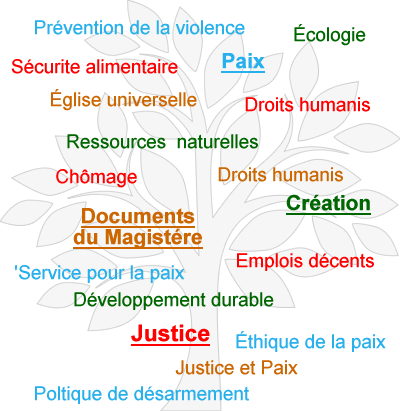Make the transition towards a people-centred and sustainable economy finally happen
12.07.2023
Open letter of the Justice and Peace Patria Grande and Europe to the CELAC-EU Summit participants. Read it here both in English and Spanish.
The Catholic Justice and Peace Networks of the Patria Grande, bringing together 14 Commissions and Teams that work for Justice and Peace in the nations of Latin America and the Caribbean, and Justice and Peace Europe, bringing together 32 European National Commissions for Justice and Peace, wish to call on the upcoming CELAC-EU Summit of Heads of State and Government (Brussels, 17-18 July 2023) to agree on necessary steps for a transition towards a people-centred and sustainable economy. This will above all require the initiation of transformation processes of the production, marketing and consumption systems that affect natural assets and people, especially indigenous and Afro-descendant communities in Latin America and the Caribbean (LAC).
Against the background of the current geopolitical situation and in view of meeting the global climate objectives, the European Union has recently announced a set of actions to "ensure its access to a secure, diversified, affordable and sustainable supply of critical raw materials ". In this respect, the EU has declared to foster global alliances on raw materials, with a view to mitigating supply chain risks, reducing strategic dependencies and enhancing its energy and economic resilience. Increased European demand for raw materials will, however, inevitably lead to more mining and extractivism in LAC countries.
According to a recent proposal for a New Agenda of Cooperation with Latin America and the Caribbean, the EU aims to seek "mutually beneficial partnerships" with "high social, environmental and governance standards" , without, however, providing concrete details on how these standards would be designed, safeguarded and eventually enforced. In the context of increased reliance on the private sector in a number of policy areas, including mining and extraction of raw materials, the EU is currently also in the process of negotiating a much-needed and long-overdue Corporate Sustainability Due Diligence Directive that would mitigate corporate risks and provide victims of business-related human rights and environmental abuses with access to an effective remedy. An important orientation can also be drawn from the United Nations’ Guiding principles on Business and Human Rights.
Partnerships on raw materials and processes of a ‘ just green transition ’ will only be genuinely "mutually beneficial", if they follow the premise of integral ecology and take into account all the related environmental, social, economic, human and cultural aspects. Besides the recognition of past injustices that in certain forms regrettably still keep perpetuating imbalances and inequalities in EU-LAC relations, this very much also implies listening to the experiences of local communities affected by mining and extractivism in partner countries.
The following observations and recommendations are based on careful mutual listening and dialogue between Justice and Peace Commissions in LAC countries and in Europe: First of all, we ask the Summit participants to dedicate a particular attention to the following production areas that imply high risks for the local communities and their environment:
a) open-pit mining, with blasting of soil and rocks and subsequent leaching processes with chemical substances that contaminate soils and rivers;
b) obtaining lithium carbonate by drilling salt flats in high-altitude wetlands, extracting the brine to evaporate it in large pools to later produce lithium carbonate;
c) the extraction of fossil fuels, particularly that is carried out off shore and through fracking;
d) agricultural production through the intensive use of agrochemicals, deforestation and invasion of wetlands and intensive livestock production with antivirals and antibiotics.
Our plea with regard to these areas is to establish clear deadlines and goals for the transformation of these production and extraction systems, in view of gradually reducing the use of technologies and aggressive or polluting substances that affect people, soil, water and air. On the European side, this should also include a reflection on the sustainability of our consumption patterns and promote pertinent research leading to concrete proposals on how to decrease European demand for raw materials. At the same time, EU and LAC countries should engage jointly in multilateral processes seeking a global approach to these transformations.
Secondly, we request that the Summit conclusions urge CELAC and EU Member States to convene and coordinate dialogues with economic, social and scientific actors to establish the parameters and benchmarks of these transformation processes. These dialogues need to be followed up by the implementation of pertinent public policies that are common to and shared by all the nations that form the EU and the CELAC.
Thirdly, we urge both the EU and CELAC participants of the Summit to recognise the need for and to make a strong and concrete commitment to due diligence policies and to the Code of Conduct that companies will have to establish in line with the upcoming EU Corporate Sustainability Due Diligence Directive; these are to be considered legal obligations unilaterally assumed by companies and enforceable before the judiciary of any country in which the companies operate. In this regard, we also plead that the procedure for reporting breaches of due diligence obligations by companies in the area of Human Rights and environmental care established in the future Directive as approved by the European Parliament, be accessible to any person, group of people or public or private organisation anywhere in the world.
Finally, given that
a) the external debt of the countries of Latin America and the Caribbean often increases the pressure on LAC Governments to accept agreements on the extraction and production of minerals, food and fossil fuels for export and for obtaining foreign currency to meet the payment obligations for this debt, and
b) this situation is a serious obstacle to carrying out the processes of transformation of the production systems and their financing,
the Justice and Peace Networks of the Patria Grande of Latin America and the Caribbean and of Europe ask the Summit participants for a declaration on the urgency and need to significantly reduce the external debt of the LAC nations, with the simultaneous commitment of CELAC members to apply the reduced amounts of debt to the process of transforming the systems of extraction and production of goods and food.
12 July 2023
Justice and Peace of the Patria Grande is a network in formation that includes 14 countries in Latin America and the Caribbean.
Justice and Peace Europe is a network of 32 national Justice and Peace Commissions
mandated by their Bishops' Conferences to speak out on the fight against Poverty and for
Human Rights, Peace, Reconciliation, Development and the Care of Creation.
Download the full Joint Statement in Spanish and English
Descargue aquí la Declaración conjunta en español e inglés






